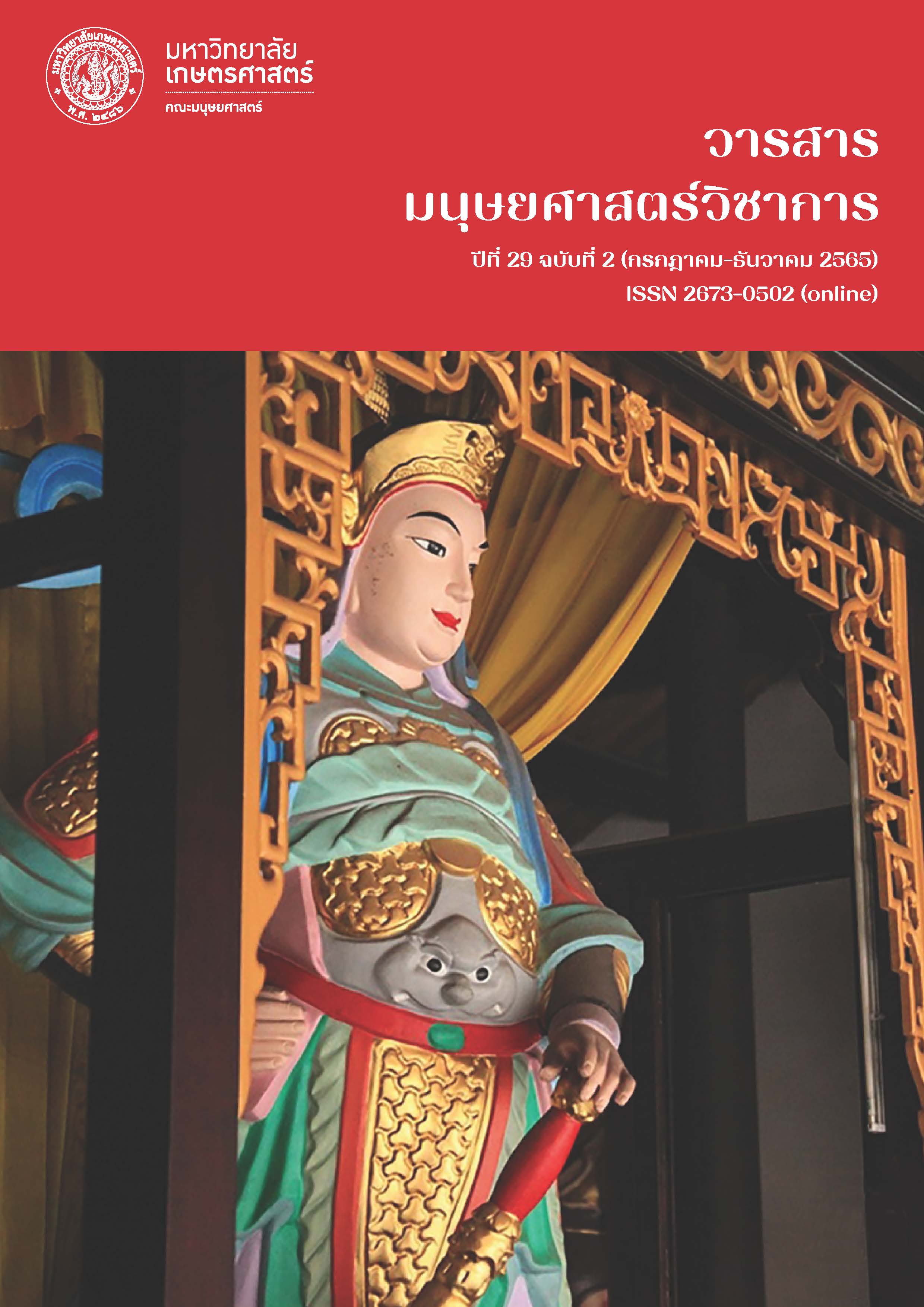Elements of Narratives in the Role-Playing among Thai-Speaking Facebook Users: A Short- and Long-Term Study
Main Article Content
Abstract
Employing social media as a platform, the role-playing acts among Thai-speaking users on Facebook are characterized by their fictional and multi-authored nature. Each of the various participants of this virtual storytelling, whose interactions are limited exclusively online, assumes two roles simultaneously: on the one hand, the participants are role-playing as fictitious characters in the story, ones which they originally created for themselves; on the other, they collectively act as the author, pushing the narrative thread forward.
This study aims to illuminate how the participants of this virtual role-playing on Facebook develop and connect the chains of events within the story. The data is gathered from four role-playing groups on Facebook, two of which are short-term (lasting 7-10 days), while the others are long-term (extending from over three months to a year). The subjects of the study have been drawn through accidental sampling, with at least 7 days of constant activities within the group, and analyzed through Eric Miller’s framework of storytelling (Miller, 2010), which defines “story” as the chains of events, and “storytelling” as the connections between such chains of events.
It is found that the role-playing acts in all the four Facebook groups were driven by improvisation. None of the participants were aware of the exact direction of the storyline toward which they were heading together. Instead, each would take turns generating an event based on the one previously introduced by the last participant. The process was then repeated, pushing the story forward, as individually generated events were strung into a single, unified chain of events.
Article Details

This work is licensed under a Creative Commons Attribution-NonCommercial-NoDerivatives 4.0 International License.
References
จันทิมา อังคพณิชกิจ. (2561). การวิเคราะห์ข้อความ (พิมพ์ครั้งที่ 2). กรุงเทพฯ: มหาวิทยาลัยธรรมศาสตร์.
มิ่งขวัญ สังขะวัฒนะ (2563). การเปลี่ยนผลัดการเล่าเรื่องภาษาไทยในชุมชนการเล่นบทบาทสมมติบนเฟซบุ๊ก: ศึกษาตามแนวคิดกฎในการมอบผลัดของแซกส์และคณะ. วารสารวจนะ, 1(8), 46-67.
มิ่งขวัญ สังขะวัฒนะ และสุธาสินี ปิยพสุนทรา. (2562). คำเรียกตัวละครและคำเรียกเจ้าของตัวละครของผู้เล่นชาวไทยในกลุ่มการเล่นบทบาทสมมติบนเฟซบุ๊ก: การศึกษาด้วยแนวคิดปัจจัยที่มีผลต่อการใช้ภาษาผ่านสื่อคอมพิวเตอร์ใน เอกสารนำเสนอในการประชุมวิชาการบัณฑิตศึกษาระดับชาติ สรรพศาสตร์ สรรพศิลป์ ประจำปี 2562 (น. 394-411). ปทุมธานี: มหาวิทยาลัยธรรมศาสตร์.
รัชชานนท์ จิตรีสรรพ และนรุตม์ คุปต์ธนโรจน์. (2562). อนุภาคและแบบเรื่องของเรื่องเล่าสยองขวัญสมัยใหม่ในแอปพลิเคชันจอยลดา. จาก https://rsucon.rsu.ac.th/proceeding/article/2178.
วัชระ กัณธียากรณ์. (2557). การวิเคราะห์รูปแบบการร้องด้นสดของบอบบี แมคเฟอร์ริน (วิทยานิพนธ์มหาบัณฑิตสาขาสังคีตวิจัยและพัฒนา). มหาวิทยาลัยศิลปากร, นครปฐม.
ศิริพร ปัญญาเมธีกุล. (2546). ความต่อเนื่องของปฏิสัมพันธ์ในห้องสนทนาไทย: การส่งผลต่อกันระหว่างการเชื่อมโยงความ การมอบผลัดและความเกี่ยวข้องของเรื่องที่สนทนา (วิทยานิพนธ์ดุษฎีบัณฑิต สาขาภาษาศาสตร์). จุฬาลงกรณ์มหาวิทยาลัย, กรุงเทพฯ.
ศิริพร ปัญญาเมธีกุล. (2558). ภาษาและอินเทอร์เน็ต. กรุงเทพฯ: พริ้นคอนเนอร์.
สรณัฐ ไตลังคะ. (2560). ศาสตร์และศิลป์แห่งการเล่าเรื่อง (พิมพ์ครั้งที่ 3). กรุงเทพฯ: มหาวิทยาลัยเกษตรศาสตร์.
อุไรวรรณ สิงห์ทอง และคณะ. (2560). การศึกษาการใช้คำสแลงในเว็บเพจอีเจี๊ยบ เลียบด่วน. ใน รายงานสืบเนื่องจากการประชุมระดับชาติ ครั้งที่ 4 สถาบันวิจัย มหาวิทยาลัยราชภัฏกำแพงเพชร 22 ธันวาคม 2560 (น. 143-158). กำแพงเพชร: สถาบันวิจัย มหาวิทยาลัยราชภัฏกำแพงเพชร.
Longacre, R. E. (1983). The Grammar of Discourse. New York: Plenum Press.
Miller, E. (2010). Theories of Story and Storytelling. Retrieved October 15, 2019, from http://www.storytellinginstitute.org/24.pdf.


